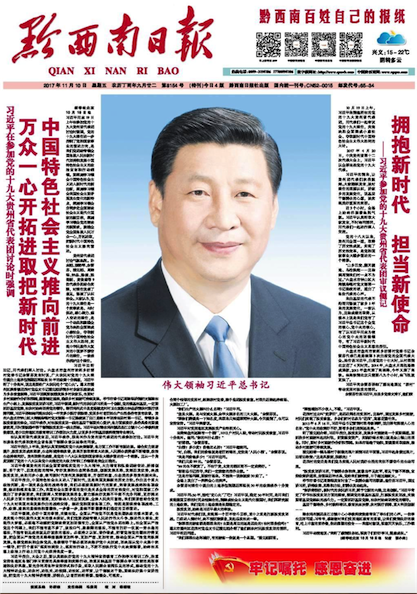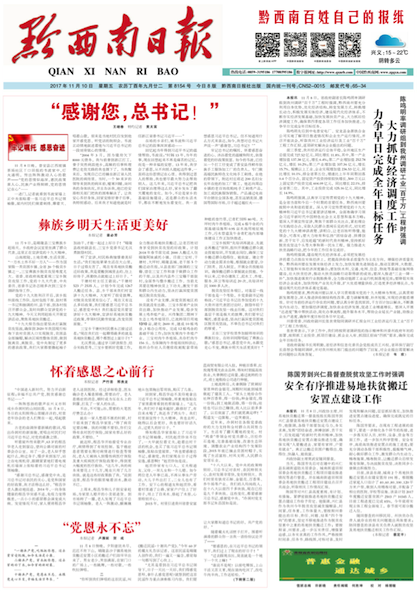Those who were staying current last week on the rumblings of the Chinese Communist Party’s flagship newspaper — and don’t we all? — would surely have noticed the editorial carried at the bottom of the front page on Monday, January 15. The headline of the piece began as usual with fist-clenching resolve: “Firmly Grasping a Historic Period of Opportunity with Great Prospects.”
The piece was attributed to “Xuan Yan” (宣言), which in Chinese means “declaration,” almost certainly a byline invented for the marshalling of important viewpoints from somewhere close to the top of the power pyramid. And here is how “Declaration” began:
On January 5, General Secretary Xi Jinping gave an important speech at the opening of a study session for the spirit of the 19th National Congress of the CCP, clearly pointing out that our nation now stands at a time of great prospects and historic opportunity. This was General Secretary Xi Jinping’s comprehensive survey of historical advances in the past, present and future, and it looked at the ebb and flow of the country, political parties and the national people, making major strategic assessments. [It] was an expression of how the nation and the national people have entered a new era of socialism with Chinese characteristics, and it revealed a far-sighted Chinese Communist Party that can see history clearly, and has the courage to make history.
But perhaps the most important passage comes toward the end of the article, which refers to the “core,” a status conferred on Xi Jinping back in the fall of 2016, and to “the leader,” or lingxiu (领袖), a word that hardly rings in English but in Chinese bears far more weight than a simple lingdao (领导), which can also be translated as “leader.”
Coming upon this great age, we have matchless pride and self-confidence; facing this precious historical opportunity, we have a great sense of responsibility. Let us give firm allegiance to the core (拥戴核心), standing loyally with the leader (紧跟领袖).
Back in the fall, several weeks ahead of the 19th Party Congress, there was some chatter about whether Xi Jinping might be elevated from “core” status to reach “leader” status. After a speech in which Fan Changlong (范长龙), the vice-chairman of China’s Central Military Commission, referred to Xi Jinping as “leader,” BBC Chinese ran a report with the headline: Will ‘Xi the Core’ Be Upgraded to ‘Xi the Leader’ at the 19th Congress?”
The 19th Congress marked an unmistakable elevation, with Xi Jinping being “crowned” with his new banner term, “Xi Jinping Thought of New Era Socialism With Chinese Characteristics” (习近平新时代中国特色社会主义) which was quickly shortened to “Xi Jinping Thought” — putting Xi more or less on a level with Mao Zedong. And in the wake of the congress, we saw various efforts at the local and provincial level to voice allegiance to Xi.

Qianxinan Daily (黔西南日报), the official Party newspaper of a small prefecture in Guizhou province, even took the extraordinary step last November of running Xi Jinping’s airbrushed official portrait — which played on front pages across the country — with a red caption that identified him as, “Great Leader Xi Jinping, General Secretary” (伟大领袖习近平总书记).
“Great leader” is just about the roundest praise possible for a Communist Party official in China, the only precedent being Chairman Mao himself. But the praise was also, it seems, too excessive. Some time afterward, the Qianxinan Daily front page was removed from digital archives, replaced instead with not just fake news but a fake newspaper.

The word lingxiu appearing as a designation for Xi Jinping in this prominent piece in the People’s Daily is significant because this is the first time this elevated title has been extended in the pages of the Party’s flagship paper. As we saw above, the strongest praise has come up to now from local jurisdictions scurrying to show their allegiance.
The significance of the shift was noted by the Global Times, in a piece bearing the headline: “Party Paper Swears Loyalty to Lingxiu Xi.“
It is the first time for People’s Daily to refer to Xi as lingxiu. The CPC identified Xi, general secretary of the CPC Central Committee, as the core of the Party in 2016.
And what does lingxiu signify? “The word lingxiu means more than just a leader,” Su Wei, a professor at Chongqing’s Party School told the Global Times. “It is often bestowed to a leader who enjoys the highest prestige, who is the most capable and who is widely recognized by the entire Party.”
China is at a glorious crossroads, master of a 500-year history of socialism that has culminated in a new model for the whole world. As the “Declaration” piece argued, “the shortcomings of capitalist-led political and economic systems are becoming clear, the global system of governance is undergoing deep change — and a new international order is emerging.”
Three guesses as to who is the leader — the lingxiu — of this new international order.




















